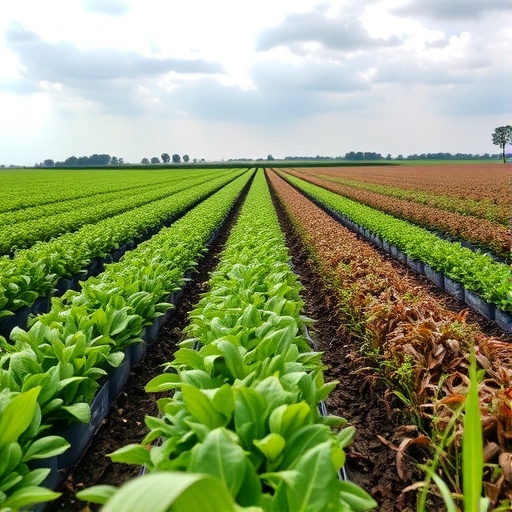Heavy metal contamination poses a significant threat to agriculture, leading to detrimental effects on food crops and consequent risks to food security and human health. Recent research conducted by Thakur, Sharma, Negi, and colleagues has unveiled the complex interplay between oxidative stress and heavy metal exposure in agricultural systems. This study, titled “Decoding oxidative stress regulation in food crops exposed to heavy metals: interdisciplinary strategies for sustainable mitigation,” illustrates the pressing need for innovative strategies in mitigating the impacts of heavy metal toxicity on crops, crucial for sustainability in food production.
The researchers delve into the biochemical pathways affected by heavy metals, pinpointing oxidative stress as a critical regulatory element. Oxidative stress arises from an imbalance between reactive oxygen species (ROS) production and their elimination, leading to cellular damage and altered physiological functions in plants. The study highlights the mechanisms through which heavy metals, such as cadmium and lead, exacerbate oxidative stress, ultimately impairing crop growth and yield.
Understanding oxidative stress in this context is essential for developing sustainable agricultural practices. The research emphasizes the significance of interdisciplinary approaches that combine molecular biology, biochemistry, and agronomy. By examining the genetic and biochemical responses of crops to heavy metal stress, the authors aim to uncover pathways that can be leveraged to enhance resilience in food crops.
Furthermore, the study identifies various phytochemicals and antioxidants that can mitigate oxidative damage in plants. Compounds such as glutathione, ascorbic acid, and phenolic compounds play vital roles in scavenging ROS and protecting cellular integrity. The application of these substances as part of agronomic practices could offer a feasible solution to combat heavy metal-induced oxidative stress in crops.
Equally important is the role of soil management in reducing heavy metal uptake by plants. The research discusses potential strategies such as bio-remediation and the use of phosphate fertilizers to immobilize heavy metals in the soil. This could minimize their bioavailability, thereby reducing the likelihood of accumulation in edible plant tissues.
The study also draws attention to plant breeding programs aimed at enhancing the natural resistance of crops to oxidative stress. By utilizing traditional breeding techniques or modern biotechnological methods, researchers can create crop varieties that are better equipped to survive in contaminated environments. This aligns with the broader objective of achieving sustainable agriculture amidst the growing challenges posed by pollution.
In its exploration of interdisciplinary strategies, the research underscores the importance of collaboration between scientists, policymakers, and farmers. Such partnerships are crucial for effectively translating laboratory findings into practical solutions that can be implemented at the field level. By engaging in dialogue and knowledge exchange, stakeholders can better address the multifaceted nature of heavy metal contamination and its impact on agriculture.
The results of this study have far-reaching implications not only for crop production but also for food safety. With increasing awareness of the risks associated with heavy metals in the food chain, consumers are becoming more discerning about the sources of their food. As a result, agricultural practices that prioritize safety and sustainability will be pivotal in meeting consumer demand and ensuring food security for future generations.
Overall, the comprehensive insights provided by Thakur and colleagues illuminate the urgent need for innovative and sustainable strategies aimed at mitigating oxidative stress and heavy metal toxicity in food crops. As countries strive to bolster their agricultural resilience in the face of environmental challenges, this research serves as a valuable resource, guiding policies and practices that prioritize the health of both crops and consumers.
Research into the effects of heavy metals on plant health not only contributes to scientific knowledge but also serves as a clarion call for immediate action. As the global population continues to rise, the demand for safe and nutritious food grows ever more pressing. Addressing the issues posed by heavy metal pollution is no longer just a scientific endeavor; it is an essential component of a sustainable future.
In summary, the integration of biological insight with environmental management presents a pathway forward in combatting the adversities of heavy metal exposure in agriculture. This study exemplifies the critical nature of such interdisciplinary strategies, as they may well determine the trajectory of global food systems in the years to come. As we reflect on the findings from Thakur et al., it becomes evident that a collective effort is required to foster agricultural systems that are resilient, sustainable, and capable of thriving in increasingly challenging environments.
The quest for sustainable practices in mitigating the effects of heavy metals on food crops is an ongoing one. The groundbreaking insights provided by this research are just the beginning of a broader dialogue, urging researchers, policymakers, and the public to prioritize the health of our food systems and the environment. As we continue to explore the complexities surrounding oxidative stress and heavy metal exposure, the potential for innovation and positive change remains vast and full of promise.
In conclusion, the work of Thakur, Sharma, Negi, and their team serves as a beacon of hope for those invested in sustainable agriculture and food security. By adopting a multi-faceted approach that encompasses scientific research, practical applications, and community involvement, we can pave the way for a future where food crops can withstand the pressures of heavy metal contamination and thrive for generations to come.
Subject of Research: The impact of heavy metals on oxidative stress regulation in food crops.
Article Title: Decoding oxidative stress regulation in food crops exposed to heavy metals: interdisciplinary strategies for sustainable mitigation.
Article References:
Thakur, N., Sharma, P., Negi, N. et al. Decoding oxidative stress regulation in food crops exposed to heavy metals: interdisciplinary strategies for sustainable mitigation.
Discov Sustain 6, 904 (2025). https://doi.org/10.1007/s43621-025-00912-8
Image Credits: AI Generated
DOI: 10.1007/s43621-025-00912-8
Keywords: oxidative stress, heavy metals, food crops, sustainability, biochemistry, environmental health.




